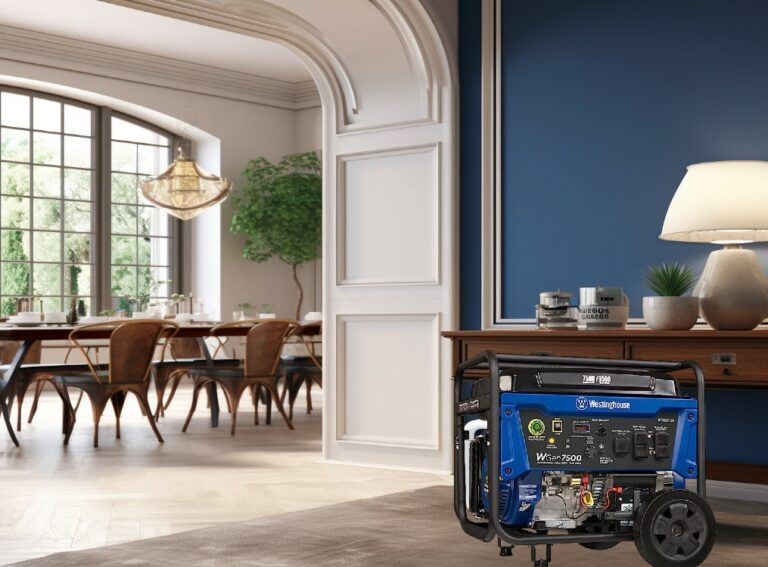How Long Can Gas Sit in a Generator?

Do you want to know how long your generator’s gas can sit unused? Are you worried about the potential consequences of leaving gas in your generator for an extended period?
If adequately treated with a stabilizing agent, gasoline can remain in your generator for up to two years. This implies you don’t have to worry about constantly replacing the fuel and can have peace of mind knowing that your generator will be ready whenever you need it.
Here are some reasons why treating your generator fuel with a stabilizing agent is beneficial:
- You can leave gas in your generator for an extended period without worrying about it deteriorating.
- Storing fuel becomes easier as the gasoline will last longer.
- You don’t have to worry about the adverse consequences of having old gas in your generator.
You will learn about the various kinds of gasoline and their respective shelf lives, proper storage methods, and the significance of carburetor maintenance.
By the end, you will possess the knowledge to ensure the smooth operation of your generator.
Factors Affecting Gasoline Shelf Life
If you want to prolong the lifespan of gasoline, it’s crucial to grasp the factors that impact it.
When it comes to gas in a generator, how long you can leave it relies on various aspects. The shelf life of gasoline in a generator can differ based on the type of gas and how it’s stored.
Regular gasoline typically endures up to three months, while ethanol-free gasoline can persist for up to six months. Ethanol blended gas, such as E10, has a shelf life of about three months.
Storing the generator or fuel container in a cool and dry place is paramount to extend the shelf life. Additionally, employing fuel stabilizers can aid in slowing down oxidation and elongating the shelf life of gasoline.
Ethanol Blended Gas Shelf Life
To maximize the shelf life of ethanol-blended gas, it’s important for you to store it properly and minimize exposure to air and moisture. Ethanol-blended gas, such as E10, has a shelf life of approximately three months. Allowing the gas to sit in your generator for an extended period can become unusable and potentially damage your engine.
Regularly replacing the fuel in your generator is essential, mainly if it has been idle for more than three months. Proper storage techniques, such as using an airtight cap and storing it in a cool, dry location, can help prolong the gas’s shelf life.
The significance of caring for your generator’s fuel is worth noting to ensure its smooth and efficient operation.
Pure Gasoline Shelf Life
When properly stored, pure gasoline can last up to six months in your generator, ensuring its optimal performance.
It’s important to understand the shelf life of pure gasoline and the consequences of letting gas sit in a generator for an extended period. Pure gasoline, devoid of any ethanol content, oxidizes slowly compared to blended gas. Nevertheless, even pure gasoline undergoes oxidation over time.
Proper storage conditions are paramount to prolong the shelf life of pure gasoline. Store your generator or fuel container in a cool and dry location, and employ an airtight cap to minimize oxygen exposure.
Fuel Stabilized Gas Shelf Life
Extend the shelf life of fuel stabilized gas using a stabilizer, which typically lasts between one to three years. There are a few factors to consider regarding generator use and keeping your fuel fresh.
• Ethanol-free gasoline: Opt for ethanol-free gasoline as it has a longer shelf life than ethanol-blended gas.
• Stale gas: Stale gas can cause issues with your generator’s performance, so it’s crucial to use fuel stabilizers to prevent degradation.
• How long can you keep it? With a fuel stabilizer, you can retain your gasoline’s freshness for up to one to three years, depending on the brand and type of stabilizer you employ.
Proper Gasoline Storage Techniques
Ensure that your gasoline storage container is tightly sealed to prevent oxygen exposure and extend the shelf life of your fuel.
When storing gasoline for your generator, proper techniques are of utmost importance. By following these guidelines, you can guarantee that your gas lasts as long as possible.
Store your generator in a cool and dry place to maintain fuel quality. Remember that gas ages from the day it’s produced, so it’s difficult to determine its age accurately. Regular E10 gasoline will begin to degrade after one month, while ethanol-free gasoline can last up to six months.
If you desire to prolong the longevity of your gas, consider utilizing fuel stabilizers that can decelerate oxidation and preserve the fuel for up to three years.
Read my article about Generator Safety Tips
Frequently Asked Questions
What Are the Potential Consequences of Leaving Gas in a Generator for an Extended period?
Leaving gasoline in a generator for an extended period can result in corrosion, clogging of the carburetor, and damage to the generator. It is crucial to explore the potential consequences and refrain from leaving fuel for prolonged durations.
Diving into the topic, it is essential to shed light on the possible outcomes of leaving fuel stagnant in a generator for too long. Firstly, corrosion can occur within the generator, leading to deterioration and potential malfunctioning. This can pose a significant threat to the overall functionality of the generator.
Secondly, the carburetor, which plays a vital role in the proper functioning of the generator, can become clogged due to the prolonged presence of gasoline. This can result in the generator being unable to generate the necessary power or function efficiently. The build-up of residues and deposits can hinder the smooth operation of the carburetor, leading to performance issues.
Moreover, leaving fuel in the generator for extended periods can cause damage to various components. The intricate parts and mechanisms within the generator can be negatively impacted. This can result in costly repairs or even replacing the generator altogether.
It is essential to consider that gasoline can degrade over time, especially when exposed to air and moisture. This degradation can lead to the formation of harmful varnish and deposits, further exacerbating the potential damage to the generator.
Are There Any Specific Ratios Recommended for Using Fuel Stabilizers in Generators?
Yes, there are specific ratios suggested for using fuel stabilizers in generators. Different manufacturers and generator models may have their recommendations. It’s crucial to adhere to the suggested ratios for optimal results.
Additionally, it’s worth delving into the specific guidelines provided by the manufacturer for your particular generator model. By doing so, you can ensure that you are using the fuel stabilizer in the correct ratio.
It is also important to note that not all fuel stabilizers are created equally. Some may have unique formulas or compositions that require different ratios for effective usage. Therefore, it is essential to carefully read and follow the instructions provided by the fuel stabilizer manufacturer.
Moreover, it is equally important to consider the type and quality of fuel being used in the generator. Different fuels may require different ratios of fuel stabilizer for optimal performance. Likewise, factors such as storage conditions and duration should also be considered when determining the appropriate ratio.
What Are the Benefits and Considerations of Using Non-Ethanol Gasoline for Generator Storage?
Using non-ethanol gasoline for generator storage offers a plethora of advantages. It can endure up to 6 months, upgrading fuel economy and mitigating engine damage. When contemplating this option, it is essential to consider the higher cost and availability. Making a well-informed decision that aligns with your specific requirements is imperative.
How Do Fuel Stabilizers Work to Extend the Shelf Life of Gasoline?
Fuel stabilizers function by postponing the natural deterioration process of gasoline, thereby prolonging its shelf life. They thwart the development of gum in the carburetor, motor, and fuel lines, sustaining the quality and performance of the fuel for extended durations.
In this article, we will delve into the mechanics of fuel stabilizers and how they operate to preserve gasoline.
To begin with, let us shed light on the fact that fuel stabilizers are designed to counteract the degradation process that occurs naturally in gasoline. By doing so, they effectively extend its shelf life.
Fuel stabilizers also play a crucial role in averting gum formation in the carburetor, motor, and fuel lines. This is equally important as it ensures that the fuel maintains its quality and performance over a longer period of time.
It is worth noting that fuel stabilizers function uniquely to prevent gum formation and maintain fuel quality.
Moreover, fuel stabilizers operate in a manner distinct from other additives. They are not like typical fuel additives that simply enhance performance or increase the octane rating. Instead, their main purpose is to preserve the fuel and inhibit degradation.
Additionally, fuel stabilizers work with other gasoline components, such as anti-oxidants and corrosion inhibitors, to provide comprehensive protection for the fuel system.
Furthermore, fuel stabilizers can prevent the detrimental effects of moisture accumulation, which can lead to fuel degradation.
Therefore, it can be concluded that fuel stabilizers are a crucial component in maintaining the quality and extending the shelf life of gasoline.
Not only do they prevent gum formation, but they also offer protection against moisture accumulation and degradation.
Can Gas and Oil Mixtures for 2-Stroke Generators Be Stabilized Using Fuel Stabilizers?
It is possible to stabilize gas and oil mixtures for 2-stroke generators using fuel stabilizers. Following the manufacturer’s recommendations is crucial to prevent degradation and damage to your generator.
It is worth delving into stabilizing gas and oil mixtures for 2-stroke generators. In the light of ensuring optimal performance and longevity of your generator, it is important to consider using fuel stabilizers. Not to mention, the benefits of fuel stabilizers are equally crucial for the overall health of your generator.
It is equally important to understand that following the manufacturer’s recommendations is crucial. Identically, this will help prevent any potential damage that may occur due to the degradation of the gas and oil mixture.
Uniquely, fuel stabilizers can help in stabilizing the gas and oil mixture, thus ensuring that it remains in a usable condition for a longer period. This is crucial for the optimal functioning of your 2-stroke generator.
Like any other machine, a 2-stroke generator requires proper care and maintenance. As such, using fuel stabilizers is not only recommended but also necessary. As the saying goes, “Prevention is better than cure.” Therefore, it is important to use fuel stabilizers to prevent any potential damage due to the degradation of the gas and oil mixture.
Furthermore, fuel stabilizers provide additional benefits to the overall performance of your generator. Additionally, they help in maintaining fuel efficiency, reducing emissions, and preventing corrosion within the engine.
Moreover, fuel stabilizers are not limited to stabilizing the gas and oil mixture. They also play a crucial role in maintaining the overall health of your generator. Therefore, using fuel stabilizers in conjunction with other maintenance practices, such as regular oil changes and spark plug replacements, is wise.
Therefore, it can be concluded that stabilizing gas and oil mixtures for 2-stroke generators using fuel stabilizers is not only beneficial but also necessary. Not only do fuel stabilizers help prevent degradation and damage to your generator, but they also contribute to its overall performance and longevity.
Conclusion
To avoid potential issues, it is crucial to be mindful of the duration gas can stay in a generator.
Factors, such as the type of gasoline and the use of fuel stabilizers, can affect the shelf life of the gas.
By following proper storage techniques and regularly maintaining the carburetor, you can maximize the longevity of your gasoline and keep your generator running smoothly.
Remember to always stay informed and take necessary precautions to ensure fuel quality.





